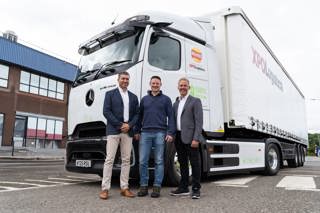One of the service centres was a bodyshop until October last year but after some number-crunching it proved more cost-effective to outsource accident repairs and use the site for servicing.
Daniels generally favours an in-house arrangement, though.
“Running our own workshops is a huge benefit,” he says. “You’ve got control over when the vehicle is serviced, you’ve got control over parts costs and you can keep downtime to a minimum.”
Average downtime for a service is two hours and the workshops run “almost like a surgery”, according to Daniels, with drivers dropping off their vehicle and using the two-hour window to undertake training or catch up with communication from the company before returning to work.
The acquisition has also enabled accident management to be brought in-house as Lewis Day had its own operation. Taking on this division has allowed staffing levels to be maintained.
“The workload that the Lewis Day fleet team lost from managing the fleet has been taken up with managing our accidents,” Griffin explains.
“And there weren’t any economies of scale with the workshop because the same amount of servicing has to be done so we managed to incorporate all of the staff.
"At this time there have been no redundancies out of the Lewis Day fleet department.”
Environmental agenda
Fleet responsibilities are essentially split between Daniels and his Eventech team, and Addison Lee CSR and quality manager Lee Wickens.
Wickens says it is his job to “push forward environmental strategy” with the fleet. He is also responsible for health and safety and legal compliance.
Addison Lee has made impressive CO2 reductions, scooping a number of awards as a result, including Best Large Private Sector Fleet and Innovation in Fleet Management in the 2011 Fleet Hero Awards.
Between 2002 and 2008 Addison Lee reduced its CO2 by 30% per journey, with a further 3.4% reduction in 2009-10 and an estimated 10% reduction in 2010-11.
“The main way we have lowered CO2 emissions on the fleet is by smart allocation of the vehicle – allocating the right car to the right job – and having the least amount possible of dead mileage ,” Wickens explains.
This is achieved by a bespoke auto-allocation system, which Addison Lee developed with software partner Haulmont Technology.
It tracks all of the vehicles using GPS and calculates the most efficient solution for each passenger pick up.
The system also takes a feed from another piece of software – Smart Grids – which measures live road speed and monitors congestion, helping to avoid congestion hotspots.
Pre-book and ‘going home’ functions significantly reduce dead mileage by giving the drivers the potential to go straight to a job at the start of their shift and to request a job in the direction of their home at the end of their shift.
The system can also allocate jobs to the two Nissan Leafs which Addison Lee is trialling.
“We can make sure we only allocate jobs in central London going within central London,” Griffin says.
“We’re experimenting with that, we’re trying to see how many jobs they can do at that level and
what sort of range they achieve and how possible it is to charge them between jobs.”




















Login to comment
Comments
No comments have been made yet.